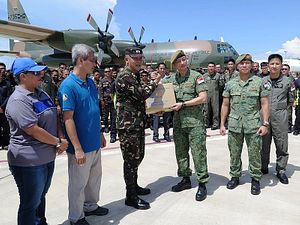This week, Singapore and the Philippines concluded a new urban warfare training initiative that was first announced as part of the city-state’s assistance to Manila to combat the terror threat posed by the Islamic State and its affiliates earlier this year. Though details so far remain unclear about its future direction, the engagement and the cooperation that was seen within it was an example of efforts underway by Southeast Asian states to boost their collective capacities to address the threat of terrorism.
As I have consistently observed in these pages, the five-month long siege by Islamic State-linked militants in the southern Philippine city of Marawi, which ended just last month, had sparked growing terror fears in the Asia-Pacific, underscored the well-known limitations of the Philippine military capabilities, and catalyzed efforts by regional states to help boost capacity (See: “Why Has the Philippine Military Struggles in its Terror War Under Duterte?”). Though the focus in some media accounts tends to be narrowly framed in terms of military exercises, we have in fact seen instances of this across several areas, including on terrorism financing, countering radical narratives, and sharing experiences on rehabilitation and reintegration of former convicts.
One of these areas is developing expertise when it comes to urban warfare. As an example of this capacity-building that is underway, Singapore had announced in July that it would provide counterterrorism assistance to the Armed Forces of the Philippines (AFP) that would include not just in terms of military assets and humanitarian assistance, but also use of the Singapore Armed Forces (SAF) urban training villages. Though Singapore and the Philippines have worked on other security initiatives before as part of their bilateral ties and also with other regional states on a multilateral and minilateral basis, this was a significant development because Philippine defense officials themselves have admitted that urban warfare training is an area of urgent need right now.
Last week, we saw the official start of this urban warfare training when forty soldiers from the Philippine Army (PA) had arrived in Singapore for a two-week professional exchange program. The program was conducted by the Infantry Training Institute (ITI) at the Murai Urban Training Facility (MUTF), a facility developed to boost SAF expertise in urban operations (UO) capabilities that offers a range of realistic, related training scenarios (See: “Singapore-Philippines Urban Warfare Training Kicks Off”).
So far, the publicly announced parts of the training have been focused around tactics, skills and basic missions. According to Singapore’s defense ministry (MINDEF), content-wise, the emphasis has been on information sharing on small unit tactics, techniques and procedures (TTPs) and individual skill sets needed to operate in a complex urban operating environment.
The exchange also culminated in both sides executing a Platoon UO mission. Though few details were publicly disclosed about that mission, MINDEF emphasized that while the Philippine Army personnel had gained an opportunity to hone their skills in urban operations, Singapore had also benefited in that knowledge about the Marawi operations would inform the SAF’ own UO training procedures for learning.
This is just the first official interaction we have seen between the two countries in terms of urban warfare training, and it will be interesting to see how things progress on this front, not just on its own but within the broader context of Singapore-Philippines ties – with both countries working up to the commemoration of the the 50th anniversary in 2019 – as well as the counterterrorism cooperation in the wider region, which Singapore will be helping shape next year given that it will hold the annually rotating ASEAN chairmanship. Singapore’s Defense Minister Ng Eng Hen noted on Facebook on Wednesday that on Singapore’s end, the SAF is prepared to do more on this front if it is requested to do so by the Philippine government.

































